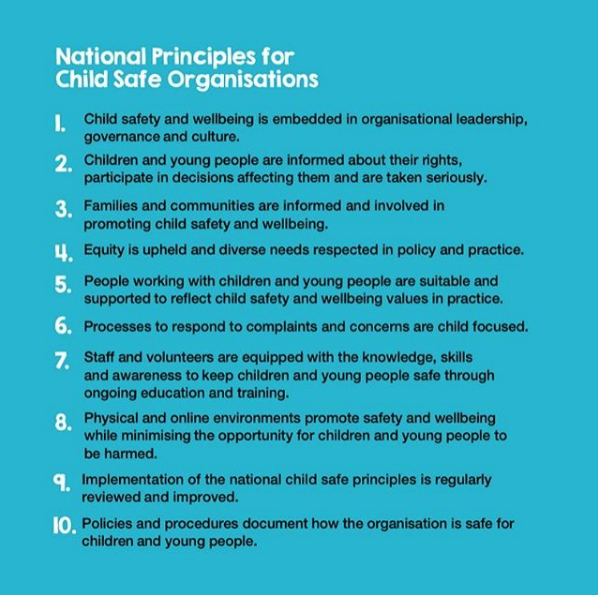For those of us in Australia, we have the great privilege of living in a country that is striving to make things safe for all people. One of the initiatives that has been introduced is the National Principles for Child Safe Organisations from the Australian Human Rights Commission. You may have seen us make a post about this on our instagram recently, but here we thought we’d let you know how this all fits in with Safe Ministry Check and how we help churches to implement all of these principles through our Safe Ministry Check tool.
There are 10 National Principles for Child Safe Organisations:
- Child safety and wellbeing is embedded in organisational leadership, governance and culture.
- Children and young people are informed about their rights, participate in decisions affecting them and are taken seriously.
- Families and communities are informed and involved in promoting child safety and wellbeing.
- Equity is upheld and diverse needs respected in policy and practice.
- People working with children and young people are suitable and supported to reflect child safety and wellbeing values in practice.
- Processes to respond to complaints and concerns are child focused.
- Staff and volunteers are equipped with the knowledge, skills and awareness to keep children and young people safe through ongoing education and safe ministry training.
- Physical and online environments promote safety and wellbeing while minimising the opportunity for children and young people to be harmed.
- Implementation of the national child safe principles is regularly reviewed and improved.
- Policies and procedures document how the organisation is safe for children and young people.
Now, while we could go through points one to 10 and explain how Safe Ministry Check helps you to fulfil all of these, we thought we would just pick a couple.
Firstly, point number one is so important to Safe Ministry Check. One of our goals as an organisation is to help churches embed a safe culture. We’ve done articles on this in the past, but it’s the thing we always come back to. We’re so determined to help churches embed safe cultures that we offer our member training – the training that helps all members of your church to know how to spot safe and unsafe practises and report what they need to – for free. By having everyone do this training, your church will develop a safe culture.
The 5th principle out of the ten focuses on suitable people working with children. How can you make sure that you have suitable people working with, not only children, but vulnerable people as well? You screen them. You do referee checks. You verify their working with children checks. You give them the training that they need for their role. If you need help with this, let us know. Our system can help you do all the necessary checks to screen your volunteers to make sure they are suitable people.
The final point we wanted to look at today was point 10. It’s really important for your church that your safe ministry policies and codes of conduct are publicly available and that you give a copy to each of your leaders and volunteers. We have designed some example policies for churches so that they don’t have to start from scratch. Also, we help you to distribute your policies and procedures to all of your members so that they can be on board with your organisations safe ministry practises.
If you’re a church looking to implement these 10 principles in your church, Safe Ministry Check is here to help you. We’re determined to make churches safe places for children and vulnerable people, so get in contact about using our system for your churches safety.

